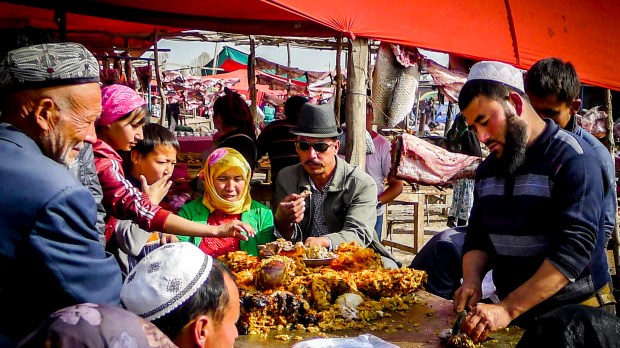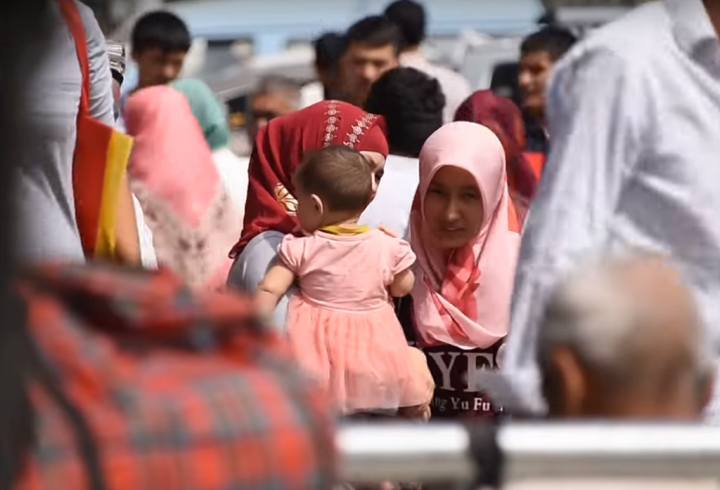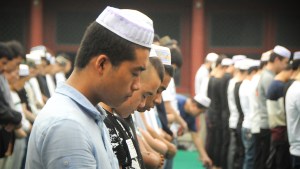Here’s another distant part of the world with an unpronounceable name that many people would have trouble locating on a map, and with a people whose name is maybe even more unpronounceable.
“Why should we care about it?” An understandable sentiment. But one answer might have to do with the clothes you’re wearing or the phone you’re using to read this article right now.
The name of the place is Xinjiang (pronounced something like sheen-jee-AHNG), and the people involved are known as Uyghurs (HWEE-gwers or HWEE-ghers). You might have heard about them in the news in recent years. In fact, if you were following the Winter Olympics from Beijing last month, you might have read that certain people were upset that the games were even being held in China, whose government, they point out, has severely persecuted Uyghurs in recent years. Some even call it a genocide.
In 2000, the Australian Strategic Policy Institute (ASPI) issued a report identifying 27 factories in nine Chinese provinces that are using forced Uyghur labor. The factories claim to be part of the supply chain of 82 well-known global brands.
But it’s not just forced labor that troubles people like Mamtimin Ala, a Uyghur activist living in Australia. Ala, the author of Worse Than Death: Reflections on the Uyghur Genocide, explained in a recent interview that China’s persecution of Uyghurs is slowly eradicating a people and their culture. He says Beijing’s policy grows out of a longstanding intolerance of Uyghurs on the part of the majority Han Chinese population, and that China has strategic interests in the northwestern territory. In addition, Xinjiang is very rich in oil, cotton and other natural resources.
Ala was born in Xinjiang in 1971 and defected to the West in 2000. Though he is a Muslim, he studied at the Catholic University of Leuven in Belgium, where he earned a Ph.D. in Philosophy. He currently serves as representative to Europe of the East Turkistan Government in Exile.
He spoke with Aleteia from his home in Sydney, Australia.
Let’s start with some basics. What are Uyghurs, and what/where is Xinjiang?
Uyghurs are a people of East Turkestan, which is called by China the Xinjiang Autonomous Region as a colonial name that’s been used since 1955. Uyghurs have had a long history in that area and have created a splendid culture as a mixture of Eastern and Western civilizations, from Greek civilization to others, such as the Indian, Persian and later Islamic civilizations. So the Uyghur culture has a very complex face and is quite rich as well.
Uyghurs have been colonized by China since 1949, after the collapse of the Second East Turkestan Republic, which was created with the aid of the former Soviet Union. Since 1949, Uyghurs have been living under communist rule, and have experienced a series of very harsh assimilation policies, which have ultimately culminated in the current genocide. This genocide has resulted from a constant refusal of Uyghurs to be part of the Chinese nation and lose their unique cultural identity. Uyghurs have paid a heavy and almost fatal price for this refusal to be Chinese, simply speaking.
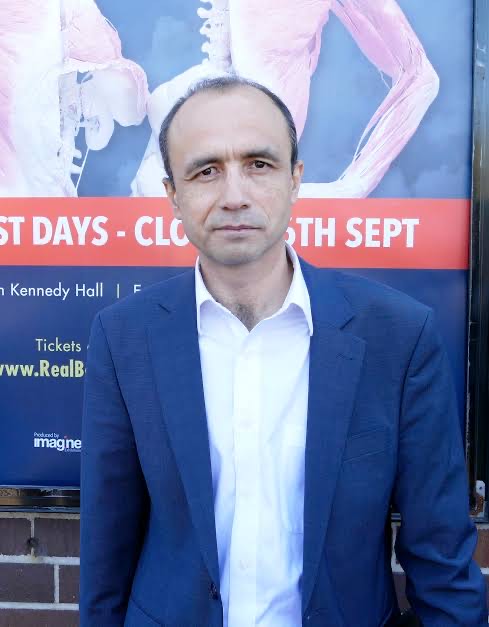
Tell me about your own experience growing up in Xinjiang.
I was born in 1971 in Artux City, to a family of Uyghur intellectuals. Artux City is closer to Kyrgyzstan, on the western side of East Turkestan. It’s also close to Kashgar, one of the ancient Uyghur cities, which flourished during the heyday of the Silk Road business routes. Later on, the Silk Road was abandoned to the opening up of sea routes, after the 15th and 16th centuries. Uyghur culture got a heavy blow from this rapid change from inland routes to the sea routes.
In 1989, I went to Kashgar University. It was that year that we witnessed the Tiananmen Square student movement, which was heavily suppressed by the Chinese government. We were shocked to see how the Chinese government was so brutal in its crackdown on dissident voices and voices of the young generation. As a member of the young generation, I was disillusioned with the communist state, which promised us we could be hopeful and flourish greatly in that communist state, but the crushing of the student movement spoke to us in a totally different tone and language. I felt I’d been deceived. They sold us a vision of utopia, but actually we lived in a dystopian world. That was the turning point in my life that I should seek some kind of political freedom in the West.
I went to Beijing in 1999 and applied for a student visa at the Belgian embassy. I met Ilhan Tohti, a famous Uyghur scholar, who introduced me to the very complex Chinese society in Beijing, where there were also Uyghurs. He was quite influential among the Uyghur community in Beijing. In Beijing I saw the growing intolerance of Han Chinese to the presence of Uyghurs in inland China, including Beijing, Shanghai, Guangzhou and other areas of China. There was a simmering tension between Uyghurs and Han Chinese in those cities. That was a prelude to a growing sense of animosity against Uyghurs, both in East Turkestan as well as the inner parts of China.
When the US was attacked by al Qaeda terrorists on September 11, 2001, the US declared a war on terror. That was a great opportunity for China to apply that label to Uyghurs. Gradually, indiscriminately, the Uyghur resistance has been labelled as terrorism. Ultimately, China has suppressed lots of Uyghur voices in the name of counterterrorism measures. Since 2014, when Xi Jinping took power of the Chinese Communist Party, the Chinese government has accelerated its ultimate plan to eradicate Uyghurs, again, in the name of counterterrorism.
I left China in 2000, and later, my friend, Ilhan Tohti, was arrested and was given a heavy sentence for being a separatist. His voice was silenced.
Was the animosity between Han and Uyghurs because Uyghurs were moving to big cities?
Migration is one of the reasons. As part of the Chinese colonial policy, China has encouraged a mass influx of Han Chinese into Xinjiang since 1949. So actually, at the beginning Uyghurs resisted against this unlimited and unauthorized arrival of many Han Chinese into Xinjiang. They were given special treatment, like job opportunities; they were given land. … They attracted lots of Han Chinese migration from mainland China to establish themselves in East Turkestan permanently. … It’s like a population colonialism that the Chinese government tried to establish demographic changes to turn Uyghurs into a minority on their own soil.
At the same time, some Uyghurs tried their luck in Chinese cities to find business opportunities, establish links with Chinese factories to bring some goods from those factories back to Xinjiang. Others sell street food, etc. but due to the difference between values and religions, there were some misunderstandings and tensions, even small-scale clashes. But Uyghurs don’t feel any kind of shame to be there, because they knew that millions of Han Chinese already migrated into their homeland.
What is Beijing’s interest in this territory?
First of all, it’s strategic. Ironically, in the 1940s it was Stalin who introduced Xinjiang to Mao Zedong, saying this is very rich land. At that time the CCP was in a civil war with the Guomintang and didn’t have enough political and military capacity to invade Xinjiang, but Stalin also promised Mao and other CCP leaders: We’ll keep the land for you, and if you need it we can transfer it to you.
Since then Xinjiang has become a strategic area for Chinese development. It has military strategy in the sense that it’s a gateway into Central Asia and the Middle East. That’s why it’s quite crucial.
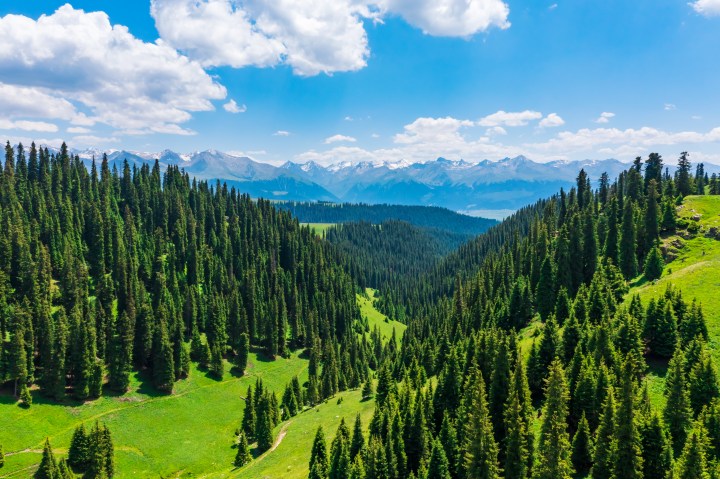
Number two, economically, it has very rich minerals, even oil. If we were independent, we would be quite a rich country. We have cotton, which is both a curse and blessing. A curse in the sense that farmers are forced into slave labor to cope with the ever-increasing demand for cotton.The entire Chinese clothing industry has relied on the cotton production of Xinjiang.
Economically, the area is crucial. It’s like the liver of China: it produces blood for China’s economy. Without Xinjiang, China’s economy wouldn’t be that aggressive, wouldn’t be that successful.
Economically, the area is crucial. It’s like the liver of China: it produces blood for China’s economy. Without Xinjiang, China’s economy wouldn’t be that aggressive, wouldn’t be that successful.
Mamtimin Ala
Number three, China wants to disperse its population further into the Xinjiang area. There are lots of incentives, lots of favorable policies for Han Chinese.
Number four, that area has a future function for China’s government to occupy or at least make some Central Asian country a vassal state of a vassal state of China through economic coercion, through economic infiltration, through economic influence. As we saw there was internal turmoil in January 2022 in Kazakhstan; both Russia and China tried to control the status quo there to stabilize the government. That tells us that the Kazakh government was under a huge control of both the Chinese and Russian governments.
Xinjiang is largely Muslim, and I assume you’re a Muslim.
Yes.
Could you describe the religious atmosphere in Xinjiang. What role does Islam play in society, in people’s lives?
Uyghurs are predominantly Muslim. Uyghurs also have Christians as a minority. Both Uyghur Christians and Muslims have been suppressed by the Chinese government.
Islam is quite crucial for Uyghurs as part of their identity, far deeper than any other aspects of their identity. Uyghurs have practiced Islam in a very moderate way. In colonial life, religion has a very complex function. On the one hand, the CCP is a fiercely atheist regime. Not only does it not tolerate any religion but it also wants to eliminate religion, including Catholicism, Islam, anything.
In 1949, China allowed Uyghurs to practice their religion in a limited sense in order not to provoke them against its very volatile power establishment there. During the Cultural Revolution, China’s government suppressed the religious expression of Uyghurs altogether. But after the Cultural Revolution had ended, people started to embrace their religion to rediscover their identity.
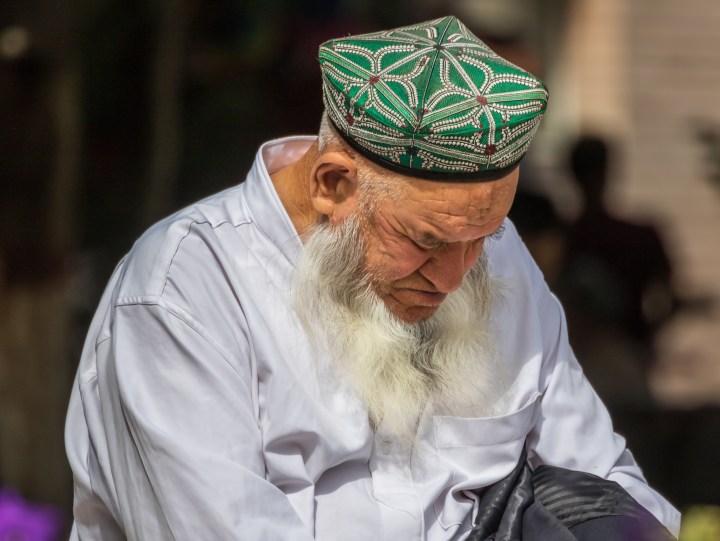
In the 1990s there were global Islamic awakenings and movements, thanks to improvements of global communications. Uyghurs were influenced by these ideas, movements, ideologies, etc. At the same time, the Chinese government increased its pressure on Uyghurs to relinquish their culture and the Islamic religion. But they embraced Islam more and more because their religion was their only solace for them to cope with the humiliation and troubles of colonial life, almost on a daily basis. This led to a vicious circle: the more adamant that Uyghurs tried to keep their religious identity to resist cultural assimilation, the more violent the Chinese government became, to suppress Uyghurs. So this vicious circle has ended up being a genocide.
Uyghurs have never given up on their religious identity, because their religion is kind of like a boundary line between the world of Han Chinese and the Uyghur world, which excludes sharing some common space, for example marriage, having intimate relationships with Han Chinese, etc. So Islam has become a kind of spiritual shield against the ongoing assault of Chinese culture upon Uyghur culture. But then, realizing how powerful the shield was, and to speed up this forceful and violent integration, the Chinese government tried to destroy this shield, at all costs.
Hence, the religious institutions, ideas, figures and others were relentlessly and violently suppressed, until 2017, when the concentration camps became a reality, became known to the world. Prior to that there was a heavy crackdown on religious expression of Uyghurs.
But you don’t need to show your religious identity outwardly. You keep your prayers in your mind, making them invisible in that hostile environment. So China gradually became paranoid to try to integrate into daily life of Uyghurs, to stop them from practicing Islam even in private. China’s government sent more than 1 million cadres into Uyghur homes to observe their life. They had to stay with the Uyghur family, eat together, even sleep together. So through this invasion of the very intimate sphere of Uyghurs life, Islamic practice was severely affected.
Besides this, China created these camps where millions of Uyghurs were incarcerated, and in the camps they were forced to eat pork. … That’s the last resort for Uyghurs to embrace, to keep their religion functional in their heart. … In the camps, Islam is banned from being an acceptable practice. Even the greeting “Salaam Aleichem” is banned, and if anyone is caught saying it, he would be immediately sent to the camp, where he might suffer severe humiliation, torture, rape, organ harvesting, death.
So in this case, Islam, which previously has been embraced by Uyghurs as the main spiritual shield against colonial assimilation, has become something that Uyghurs must refrain from, something that Uyghurs must give up openly or professionally, to be accepted by Chinese society or Chinese communists.
In other parts of China, Christian churches are controlled by state agencies. But it sounds like in Xinjiang houses of worship or religious schools are not even allowed to be open, right?
That’s right. And it’s impossible to have religious schools right now. Even a simple religious terminology is forbidden, and people pay a fatal price for uttering certain religious terminology.
Not even that, even religious clothing, religious symbols are banned from public life. The mosques are demolished, as reported by satellite imagery. It’s quite gradual destruction. First of all there is a reduction of the Uyghur population, and hence reduction in the attendance at religious activities. So demolishing mosques is quite necessitated because nobody is able to go. So it’s a great incentive for China to demolish mosques.
Is there much information getting out of Xinjiang now? How can we know what’s happening?
There are no channels for information. There are about 10 Uyghur genocide survivors, and they all have dual citizenship. That’s why they were released from camps into second countries, such as Turkey, Egypt, or Kazakhstan, where they were assisted by some international organizations to escape. Most of them ended up living in Europe or the US and are able to give us a horrific picture of the camps and slave labor factories.
The second source of information is satellite images. It’s quite precise to calculate the size and change of known or newly built concentration camps. There are lots of organizations doing this through sophisticated technology.
Third, the Chinese government from time to time issues some figures. For example, they might say “We have accomplished training opportunities for X number of people.” We can understand this as people who have completed the training sessions have actually gone through this brainwashing or torturous journey inside and outside the camps, and also in slave labor factories, etc., but the Chinese government information is never reliable, and China is quite good at deceiving the world by shifting the goal posts and changing its narratives about the camps and its policies for Uyghurs.
There’s no way to phone or email people there?
No. There’s no way for us to contact them. I haven’t been able to contact my family for the past eight years. Because of my political activity, my parents were scared about repercussions. So ultimately I stopped contacting them, in order for them not to suffer from the Chinese government. But of course, it doesn’t stop the Chinese government harassing my family. I just don’t want to give them any additional trouble.
Most Uyghurs have stopped communicating with their family for the past five years. It’s almost like everything is blocked from the outside world, and nobody knows what’s happening inside that horrific dark world.
Who, internationally, is working to address this problem? The US Government? Human rights groups?
The United States is the first government to acknowledge the Uyghur genocide. Under the Trump administration, the issue was part of some trade negotiations and human rights dialogue with China, quite forcefully. The Biden administration has inherited the issue, but it’s just words, not actions. So no substantial actions and effective measures of the US government has ever been placed on China to stop its genocide. Actually, China has expanded the scope of the camps and continue with its genocide. So there’s no international impact on China’s behavior at this stage.
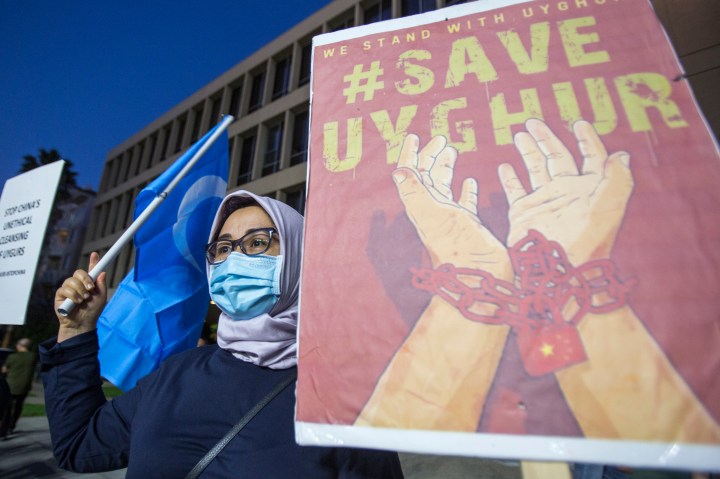
Some human rights organizations are keen to report on what’s happening to Uyghurs. Human Rights Watch has published some reports, which is quite reliable information.
Unfortunately, the UN is mute. There are international organizations such as the UN Human Rights Council, which has been quite ineffective to make China accountable for its genocide. Despite the fact that lots of governments, such as Belgium and the UK, have acknowledged the nature of the Uyghur crisis, that it should be categorized as genocide, no substantial action has been taken to stop this genocide and hold China accountable for its crimes against humanity.
Also, the Muslim world is silent, mute, shamefully. Almost all of them, including Turkey, Pakistan, Egypt, Morocco, the United Arab Emirates, etc., have been part of China’s Belt and Road Initiative. They have had huge business interests with China. So that’s one of the reasons they have remained silent about the Uyghur genocide.
And, despite the international criticism of China’s worst human rights record, the International Olympics Committee facilitated the organization of the games in one of the most authoritarian regimes on earth – a repetition of the Olympic Games in Munich in 1936.
I also don’t remember any big celebrities who have spoken out for justice and against the inhuman practices. Hollywood is a good example. The NBA is a good example. They are all afraid to make China displeased and lose major business opportunities.
Is the Christian community doing anything to help? Who, specifically, and what are they doing?
The Muslims and Christians are never more united than now to face this evil force, which is China. Underground Christian communities are being suppressed by the Chinese government. China is an enemy of spiritual values. It’s high time for Christians and Muslims to rally together to stop the march of this evil force.
In Dante’s hell, the entrance hall is reserved for the uncommitted – those who are afraid to choose right over wrong, who can’t be bothered to choose.
We may need more awareness-raising activities in the Christian world, with the support of Christians as well as Catholic leaders.
